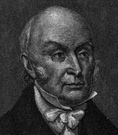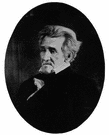|
|

The Election of 1824
A challenge to the electoral process came in 1824. James Monroe, a wildly popular president, had retired after two terms, following the example of George Washington. Monroe was so popular that in his re-election bid of 1820, he won every single state and would have received a unanimous electoral vote if not for an elector who cast his vote in an effort to keep Washington as the only president to have been elected unanimously.
In 1824, all of the candidates were members of the Democratic-Republican Party:
 John Quincy Adams, son of President John Adams, was a leading candidate this year. Secretary of State under Monroe, Adams also had a large amount of international experience, having been Minister to the Netherlands and Minister to Russia. He had the support of powerful people in the Northeast. John Quincy Adams, son of President John Adams, was a leading candidate this year. Secretary of State under Monroe, Adams also had a large amount of international experience, having been Minister to the Netherlands and Minister to Russia. He had the support of powerful people in the Northeast.
 Another leading candidate was war hero Andrew Jackson. Jackson was from Tennessee, a recently admitted state, and had the support of people in the West. Another leading candidate was war hero Andrew Jackson. Jackson was from Tennessee, a recently admitted state, and had the support of people in the West.
- Henry Clay was the author of the Missouri Compromise, Speaker of the House of Representatives, and was also immensely popular with people all over the country.
- William Crawford of Georgia also had a good bit of support, from Virginia, his birth state, and elsewhere in the country.
When the votes were counted, Jackson had the most, 99. But he didn't have enough to win. The total number of electoral votes available at that time was 261. A candidate, therefore, needed 131 to win. Adams was second in the vote total, with 84. Crawford had 41, and Clay got 37. Since no candidate had receive a majority of electoral votes, it was back to the House of Representatives.
 Clay, as Speaker of the House, had control over the proceedings and, when it became clear that something had to be done, agreed to withdraw from the race if his supporters would instead support Adams. This wasn't about electoral votes anymore, however. Each state had one vote in the House of Representatives. The country had 24 states at the time, and 13 of them voted for Adams. Clay, in turn, was named Secretary of State. Jackson and his supporters, along with many other neutral observers, denounced this turn of events as a "corrupt bargain," but the votes were counted and the son of a president was in the White House. Clay, as Speaker of the House, had control over the proceedings and, when it became clear that something had to be done, agreed to withdraw from the race if his supporters would instead support Adams. This wasn't about electoral votes anymore, however. Each state had one vote in the House of Representatives. The country had 24 states at the time, and 13 of them voted for Adams. Clay, in turn, was named Secretary of State. Jackson and his supporters, along with many other neutral observers, denounced this turn of events as a "corrupt bargain," but the votes were counted and the son of a president was in the White House.
|
|

 John Quincy Adams, son of President John Adams, was a leading candidate this year. Secretary of State under Monroe, Adams also had a large amount of international experience, having been Minister to the Netherlands and Minister to Russia. He had the support of powerful people in the Northeast.
John Quincy Adams, son of President John Adams, was a leading candidate this year. Secretary of State under Monroe, Adams also had a large amount of international experience, having been Minister to the Netherlands and Minister to Russia. He had the support of powerful people in the Northeast.
 Another leading candidate was war hero Andrew Jackson. Jackson was from Tennessee, a recently admitted state, and had the support of people in the West.
Another leading candidate was war hero Andrew Jackson. Jackson was from Tennessee, a recently admitted state, and had the support of people in the West.
 Clay, as Speaker of the House, had control over the proceedings and, when it became clear that something had to be done, agreed to withdraw from the race if his supporters would instead support Adams. This wasn't about electoral votes anymore, however. Each state had one vote in the House of Representatives. The country had 24 states at the time, and 13 of them voted for Adams. Clay, in turn, was named Secretary of State. Jackson and his supporters, along with many other neutral observers, denounced this turn of events as a "corrupt bargain," but the votes were counted and the son of a president was in the White House.
Clay, as Speaker of the House, had control over the proceedings and, when it became clear that something had to be done, agreed to withdraw from the race if his supporters would instead support Adams. This wasn't about electoral votes anymore, however. Each state had one vote in the House of Representatives. The country had 24 states at the time, and 13 of them voted for Adams. Clay, in turn, was named Secretary of State. Jackson and his supporters, along with many other neutral observers, denounced this turn of events as a "corrupt bargain," but the votes were counted and the son of a president was in the White House.
